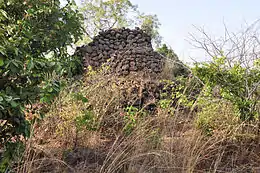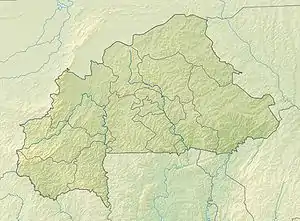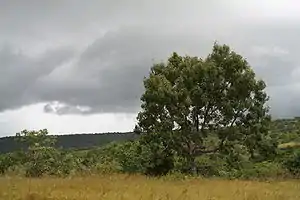Mount Tenakourou
Mount Tenakourou (also spelled Ténakourou, Tena Kourou or Téna Kourou) is the highest point in Burkina Faso. It is a hill situated on the border of the Cascades Region of Burkina Faso and the Sikasso Region of the country of Mali, not far from the source of the Black Volta. It has an elevation of 747 metres (2,451 ft). The hill is part of Burkina Faso's South-Western Paleozoic sandstone massif[2][3] and was formed through the incline of the country's Central Plateau.[4] The surrounding terrain is relatively flat and around 400 metres (1,312 ft) high.[5]
| Mount Tenakourou | |
|---|---|
 Stones at the top of the Tenakourou | |
| Highest point | |
| Elevation | 747 m (2,451 ft) [1] |
| Listing | Country high point |
| Coordinates | 10°45′00″N 5°25′00″W |
| Geography | |
 Mount Tenakourou Location in Burkina Faso (on the border with Mali) | |
| Location | Burkina Faso – Mali border |
| Geology | |
| Mountain type | Hill |
The Tenakourou is located 46 kilometres (29 mi) to the North-West of Sindou[6] and can be reached through Kankalaba. Other nearby towns are Orodara in Burkina Faso and Loulouni in Mali. One of the attractions is that the summit offers a view over three countries: Burkina Faso, Mali at a distance of 3 kilometres (2 mi) and Ivory Coast at 13 kilometres (8 mi).[6][7] In 1974, the French erected a pile of stones on the summit to raise its elevation to 750 metres.[7] Between 2003 and 2005, the National Tourism Office of Burkina Faso organised a series of high-profile climbs of the hill to raise its touristic potential.[7]
The name Tenakourou signifies "the hill of Tena" in Dyula language. Tena is the name of the village of around 600 inhabitants that lies at the foot of the peak, surrounded by scrubland. Its name means "have a seat here". The village has a mosque and a school, and sometimes hosts an Arts Festival.[7]
Although the area is considered a hotspot of plant diversity,[8] it is still relatively neglected in terms of scientific research.[9] Some of the species found are:[10]
|
|
Species of the fungus genus Scleroderma have also been identified.[11]
 A hut near the summit of Tenakourou
A hut near the summit of Tenakourou Stones at the top of the Tenakourou
Stones at the top of the Tenakourou Village on the side of Mount Tenakourou
Village on the side of Mount Tenakourou Khaya senegalensis near Mount Tenakourou
Khaya senegalensis near Mount Tenakourou
References
- "Téna Kourou" on Peakbagger.com Retrieved 30 September 2011
- Ouedraogo, O., Schmidt, M. (2011). Chaînes gréseuses. Formations saxicoles / Sandstone chains. Saxicolous formations. In: Thiombiano, A., Kampmann, D. [Hrsg.]: Atlas de la Biodiversité de l’Afrique de l’Ouest, Tome II: Burkina Faso / Biodiversity Atlas of West Africa, Volume II: Burkina Faso. BIOTA, Ouagadougou & Frankfurt/Main, pp. 390-395
- Giorgis, I. et al. "The lateritic profile of Balkouin, Burkina Faso: geochemistry, mineralogy and genesis". In: Journal of African Earth Sciences 90(2014), pp. 31-48.
- Gall, L.T., Hobby, J.M. (2007) Worldmark Encyclopedia of Nations. Detroit: Thomson Gale
- Burkina Faso-Teachers Resource, Ryan's Well Foundation
- (in French) Mont Tenakourou, Association Solidarité Djiguiya
- (in French) Sanou, W.I., Village de Tena : une colline célèbre dans un village coupé du monde, Sidwaya, 20 August 2013
- Pullaiah, T. (2019) Global Biodiversity: Volume 3: Selected Countries in Africa. Oakville: Apple Academic Press
- Schmidt, M., Thiombiano, A., Ouédraogo, A., Hahn-Hadjali, K., Dressler, S. & Zizka, G. (2010) "Assessment of the flora of Burkina Faso". In: X. van der Burgt, J. van der Maesen & J.-M. Onana (eds), Systematics and Conservation of African Plants, pp. 571–576. Royal Botanic Gardens, Kew
- (in French) Collection : Herbier National du Burkina Faso, Muséum National d'Histoire Naturelle
- Sanon, K.B., et al. "Morphological and molecular analyses in Scleroderma species associated with some Caesalpinioid legumes, Dipterocarpaceae and Phyllanthaceae trees in southern Burkina Faso." Mycorrhiza 19.8 (2009): 571-584